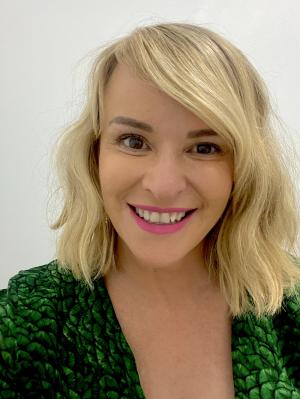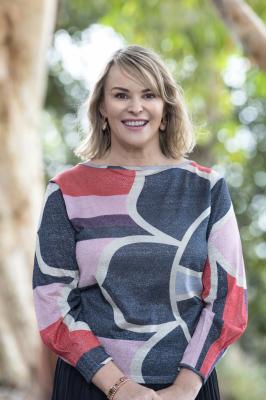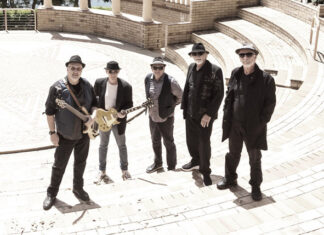If a week in politics can seem a long time, then nine months rowing against the tide as the tourism industry faces the gravest crisis in its history, must seem like an eternity to Tourism Noosa CEO Melanie Anderson.
Mel joined the TN crew (with an impressive industry CV behind her) just as the bushfires were peaking last summer, then went straight into Covid lockdowns and border closures. It hasn’t been easy, but you wouldn’t know that as Mel breezes into a Hastings Street venue on a crazy-busy Ecca holiday Friday to sit in the Hotseat with Phil Jarratt.
Let’s start with the bad news …
Yeah, I don’t know what I did in a former life! I started as CEO last November and in December we had bushfires in Peregian, Tewantin and the North Shore. Right after Christmas the fires down south kicked in and the interstate holiday market literally went up in smoke. The Australian bushfires had become international news and then in other parts of the country we had torrential rain and floods, so the international market just saw this nightmare of a country. Then we had Covid.
Before we get to the pandemic, what was the size of the downturn just from the fires?
Overall business was down about 15 percent. It was a big blip on the radar, but nothing like what was to come.
There seemed to be a short period when the bushfires had gone away and Covid was something happening somewhere else.
Yes, but my nephew, who is an avid reader and researcher had contacted me quite early and said it was going to spread. That made me start devouring all the information I could find on it, and I remember starting to think we were going to face serious issues.
Did you present your concerns to the Tourism Noosa board?
I did. I prepared a presentation on what China looked like at that point, and also what was beginning to happen in Europe. I think some people at TN felt that I was getting a little obsessive, reading every report I could get my hands on and talking about it all the time, but what we discussed at board level was how we could best prepare for what could happen.
It must have been a painful fence to sit on, when everyone in your industry only wants to hear good news and yet you have to prepare them for the worst?
Yes, it was. Firstly, I had to talk to the team and we workshopped a war plan which included recognition that a lot of our work going forward would be counselling tourism operators and ensuring that they were getting the best information to help them survive. We also had to enact a Covid management plan of our own, working from home but maintaining a solid line of communication so that we in touch with each other and with our members. We liaised a lot with state government so that we could report the industry perspective to them, and also disseminate the information effectively, and we started a Business Association meeting group with council.
You mentioned that counselling was a new area of focus. Were people in the tourism sector really despairing?
Absolutely. You have to remember that very early in the piece Noosa was in the international spotlight for all the wrong reasons, so fear built up quickly. I personally had to work with a couple of people, and I know team members did too, just to help with the rising levels of fear and anxiety. You have to remember that 98 percent of tourism here is family businesses, where often expenditure is based on last week’s takings. The idea of going into hibernation was a very serious issue for a lot of people, so we had to communicate with them and put them in touch with others who could help and advise, like the Queensland Tourism Industry Council. Now that we’re into the second wave, I think more people are able to address what’s going on and see a way forward.
Did the pain ease a bit when JobKeeper started?
The period I’m talking about was right when that was announced, but then it took quite a while to be implemented, by which time some businesses were really stretched. Even if you know something is coming, if you’re operating on a tight cash flow the wait can be very stressful. But our vulnerability was worse than a lot of places because the majority of people employed in tourism and hospitality are casuals who were not eligible for support, plus we lost a lot of international students who were part-timers and had to leave. When the statistics started to come out with a list of places hardest hit and we weren’t on it, that was a distortion of the situation because so few people in tourism were receiving JobKeeper. That was particularly concerning because it placed us in a difficult position to get funding for the industry when in fact we needed it as much or more than the other places.
Has Noosa missed out on funding while other tourism areas have received it?
It’s still in play. We have been able to promote the $10,000 small business grants to our members and help quite a few local businesses get them in the first and second rounds. That’s not something we’d normally engage in, but in a time of crisis you have to adapt and focus on the needs of your members.
Can you say how likely we are to get Queensland government funding for the local tourism industry?
Only to say that we’ve got our hands out and we’re in communication with the tourism minister and department and we’re hoping to hear soon. Having said that, our industry and every other sector experiencing problems has to be aware that there is huge pressure for government funding. It’s not easy.
I know we have to be vigilant about a second wave, and that the border is closed again, but is a semblance of normality returning?
Well, we’re still not operating in full office mode, working from home a lot, but we’re busier than ever because now it’s all about rethinking our marketing and our strategies to match the circumstances, which change week to week. You write a plan one week and chuck it out the next. We were lucky with our new Biosphere marketing campaign, which was designed to cut through the other destination marketing which is all lovely pictures. We wanted to do more and make people think, that’s quirky, where’s that? It’s also predominantly digital so that we can instantly change it as needed. Our first stats are back and we are ahead on every mechanism, and the conversion rate is extremely high.
Does it strike you as odd that the very people that campaign is aimed at are the people we didn’t want a year ago? The low yield day trippers and short stays.
Now we’ll take anyone! I’m joking, but you’re right, we’ve never targeted the drive market before, but the situation demanded it and it’s working well. We’re also working with the airport and Visit Sunshine Coast to look at opportunities for fly-ins we can target. We’re trying to keep thinking outside the box.
The Tasman bubble just popped.
And that was very sad, but we have to expect the next couple of years are going to be like this, up and down, make a plan, make a new plan.
That must put a lot of pressure on you.
Yes, it has, but I’m handling it really well. It’s a marathon rather than a sprint, so I need to make more downtime for massages and day spas (laughs). For me, like everyone else, it’s about looking after your mental health. We’ve got more tough times coming and we have to be ready to deal with that and help where it’s needed. Weekends like this Ecca holiday are fantastic, they buoy everyone up, get them pumping again and put money in pockets, but we have to look further along, especially when you consider that so many Victorian bookings for summer may need to be cancelled. That’s a big chunk of our market that may go, so you have to ask, how long will our Queensland drive market last?
What’s happened to the backpacker market during Covid?
The reality is that international backpacking isn’t happening, and Australian backpacking hasn’t really been a segment for a long time because they’ll just pile into a hotel room or an Airbnb. One of our team is spending a day a week on backpacker issues, trying to get people through the door, potentially from the universities. The main issue is that you can no longer put mixed groups in a dorm, so a room that slept 16 can now only be used by one group. Some of the hostels have changed their setups to make it work to an extent. We’re also concerned about our experience market, which was primarily international. Now we’re looking at persuading people to book a tour in their own backyard.
What’s the impact on tourism of scientific reports that our river needs help to be sustainable?
I haven’t read the most recent report yet so I can’t comment specifically, but I will say that the Noosa is one of the most amazing rivers in Australia. Green initiatives and business interests have clashed here in the past, but I think there is scope now to work together for the best outcomes. That’s what the Biosphere is about – man in the environment, within, not without. I believe we have a responsibility for the integrity of the river as well as a responsibility for the economy, so let’s work together.
Finally, we can’t have an Ecca long weekend every weekend, but we do have Noosa Show holiday coming up, and Cr Lorentson has suggested we have a locals party to keep the money moving …
Sounds great to me! I’m with Amelia on that. Let’s encourage everyone to have a holiday at home.









